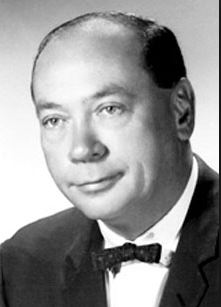
Earl Sutherland, M.D.
Dr. Earl Wilbur Sutherland Jr. was born in 1915 in Burlingame, Kansas. Sutherland received his bachelor’s degree in chemistry in 1937 from Washburn University (Topeka, KS) and earned his medical degree in 1942 from Washington University School of Medicine in St. Louis. After serving as a doctor in World War II, he returned to Washington University as a researcher in the pharmacology laboratory of Nobel laureate Carl Ferdinand Cori. In 1953, he became director of the department of pharmacology at Case Western Reserve University (then Western Reserve University) in Cleveland, OH where he discovered the role of cyclic AMP in mediating the action of certain hormones. In 1963, desiring to limit his duties to research, Sutherland moved to Vanderbilt University School of Medicine in Nashville, where he was a professor of physiology until 1973. At the time of his death in 1974, Sutherland was a distinguished professor of biochemistry at University of Miami Medical School.
In 1956 Sutherland and Dr. T. W. Rall discovered cyclic AMP. Sutherland’s further research demonstrated the ubiquitous nature and prime importance of this chemical and its associated compounds, notably adenyl cyclase, in all living things. As the result of Sutherland’s work and that of those who followed his lead, it became known that hormones are not the sole regulatory substances in the chemistry of living organisms, as had previously been believed. In many cases, necessary cellular reactions are triggered by cyclic AMP, the almost universal “second messenger,” responding to the hormonal signal. Sutherland’s work on hormones opened up new paths of research into diabetes, cancer, and cholera.
A professor of physiology at Vanderbilt University Medical Center from 1963 to 1973. He won a Nobel Prize in Physiology or Medicine in 1971 “for his discoveries concerning the mechanisms of the action of hormones,” especially epinephrine, via second messengers (such as cyclic adenosine monophosphate, cyclic AMP). In addition to the Nobel Prize, Sutherland won the Albert Lasker Award for basic medical research in 1970 and received the National Medal of Science in 1973. He was elected to the National Academy of Sciences in 1966.